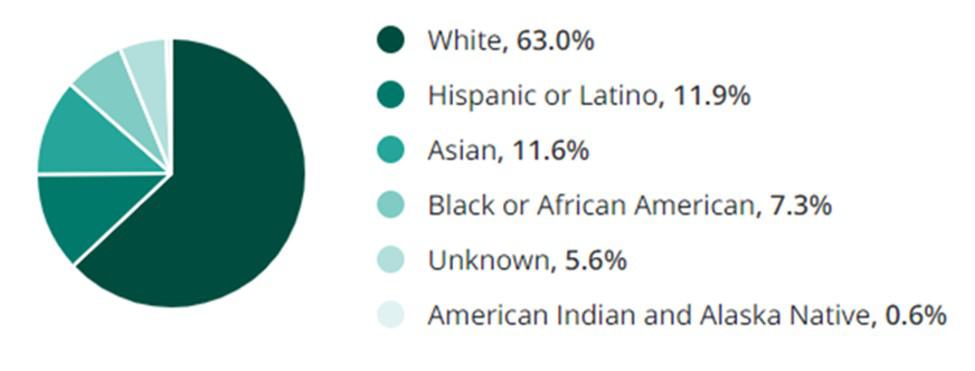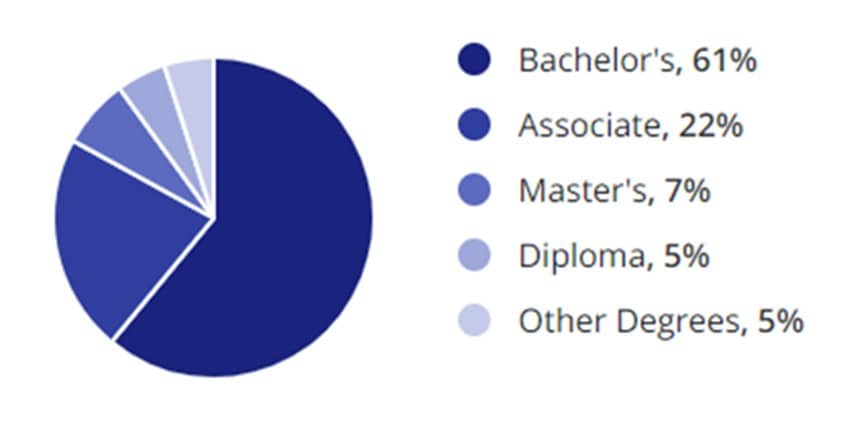Welcome to your gateway into the vibrant world of fashion jobs. This guide is designed for both budding professionals and seasoned experts aiming to forge a remarkable career within the diverse tapestry of the fashion industry. Here, we uncover the educational requirements, areas of expertise, and skills you need to thrive. We also take a closer look at the demographics shaping the industry, from ethnicity and gender to age, providing insights into who makes up the creative world of fashion.
As an industry known for dynamism, the fashion sector constantly evolves, driven by innovation, sustainability, and digital transformation. There are countless paths to explore, with roles ranging from fashion design to marketing and merchandising. Understanding the landscape, from salary trends to hiring shifts, positions you to make informed decisions about your career trajectory.
This guide is more than an overview; it’s a compass pointing you toward fulfilling, diverse, and inclusive opportunities in fashion. Whether you’re exploring entry-level positions or aiming for executive roles, your unique style, perspective, and skills are invaluable. Let’s embark on this journey together, navigating the exciting world of fashion jobs and paving the way towards a career that matches your aspirations and celebrates diversity and creativity at its core.
Educational Requirements
A solid educational foundation is crucial for success in fashion jobs. Most roles, especially entry-level fashion jobs, require a bachelor’s degree in fashion design, merchandising, or a related field. These programs teach a mix of practical skills and essential knowledge, covering topics such as textiles, color theory, fashion history, and how to forecast trends.
Certifications from reputable fashion institutes can also boost your resume. They offer specialized skills in sustainable design or digital fashion, which are becoming increasingly important in the industry. Whether aspiring to be a designer, marketer, or buyer, the right educational background and specialized certifications can set you on the path to success in the vibrant fashion world.
Attending specialized fashion schools or pursuing advanced degrees in fashion-related disciplines can be highly beneficial for those looking to refine their skills further. These advanced studies deepen your expertise and expand your professional network, opening doors to more opportunities in fashion design, marketing, buying, and merchandising jobs.
Areas of Expertise
The fashion industry offers a wide range of roles, each requiring unique skills and expertise. Here are some of the critical areas:
- Fashion Design: This is all about creating original clothing, accessories, and footwear. Designers need a solid creative vision, an understanding of the fashion market, and the ability to translate trends into appealing designs.
- Fashion Buying: Buyers are responsible for selecting and purchasing the pieces sold in stores. This role requires a keen eye for trends, strong negotiation skills, and an understanding of the store’s target customers.
- Fashion Merchandising: Merchandisers are critical in managing sales and promotions for fashion brands. They work on the business side, ensuring products reach the right market and are presented appealingly.
- Visual Merchandising: Visual merchandisers design store displays to enhance product appeal. This role combines creativity with an understanding of what drives consumer purchasing behavior.
- Fashion Marketing: Marketers develop campaigns to reach and engage target audiences. This involves creativity, strategic planning, and knowledge of digital marketing trends.
Beyond these roles, the industry also offers opportunities in areas such as fashion writer or fashion stylist, sustainability, and public relations, reflecting the sector’s dynamic and evolving nature. Whether you’re drawn to the artistic side of fashion design or the strategic thinking behind fashion marketing and buying, there are countless paths to explore in pursuing your dream fashion job.
Demographics in the United States
The fashion industry in the United States is as diverse as the designs it produces, drawing professionals from various backgrounds. Here’s a closer look at the demographics:
Ethnicity/Race:
In fashion jobs, diversity is not just a trend but a reflection of the global marketplace. The ethnic distribution in the industry includes a wide range of backgrounds, showing the industry’s commitment to inclusivity. This diversity brings many perspectives to fashion, enriching the creative process and ensuring designs resonate with a broad audience.

Gender:
The fashion sector has traditionally seen solid female representation, particularly in roles like design and retail. However, there is a concerted effort to balance gender representation across all levels, including leadership roles, to ensure diverse viewpoints shape the industry’s future.

Age:
Age diversity is another hallmark of the industry, with professionals ranging from young trendsetters bringing fresh ideas to seasoned veterans offering profound insights and mentorship. This mix of youthful creativity and experienced wisdom ensures the industry remains at the forefront of innovation and style.
Together, these demographic factors contribute to a rich, diverse, and dynamic fashion industry that is continually evolving. Such diversity fosters creativity and ensures that fashion reflects and celebrates the varied tapestry of global cultures and identities.

Salary Trends
Salaries in the fashion industry can vary significantly based on role, experience, and the brand’s prestige. For entry-level fashion jobs, salaries might start around $40,000 annually. As professionals climb the career ladder, compensation can significantly increase, with top designers and executives at well-known fashion houses potentially earning more than $200,000 annually.
Some specific roles and their general salary ranges include:
- Fashion Designer: $50,000 to $100,000+, depending on experience and brand.
- Fashion Buyer: $45,000 to $95,000, influenced by the size of the operation and purchasing budget.
- Fashion Merchandiser: $40,000 to $85,000, varying by location and specific company.
- Fashion Marketing Manager: $50,000 to $120,000, based on the scope of the marketing campaigns.
Location also plays a crucial role in determining salary. Major fashion capitals like New York and Los Angeles often offer higher wages to compensate for the high cost of living, but they also present more opportunities for career advancement.
To ensure you’re being offered a competitive salary, consider consulting resources such as salary surveys, which provide updated industry standards. Being informed helps you negotiate fair compensation that reflects your skills, experience, and the value you bring to a fashion brand.
Hiring Trends
The fashion industry is vibrant, continually adapting to new trends and consumer demands. This dynamism is reflected in its hiring trends, with several key areas emerging as focal points for recruitment:
- Sustainability: There’s a growing emphasis on eco-friendly and sustainable fashion practices, leading to an increased demand for professionals who can innovate in materials sourcing, production processes, and supply chain management.
- Digital Fashion: The digital transformation has opened up new opportunities in e-commerce, digital marketing, and virtual product design, attracting tech-savvy talent.
- Global Expansion: Brands looking to expand into new markets seek professionals with international business knowledge, cultural sensitivity, and language skills.
- Diversity and Inclusion: There’s a substantial push towards more inclusive hiring practices, aiming to reflect the diversity of the consumer base in the workforce. This includes not only ethnic and gender diversity but also a range of ages, body types, and backgrounds.
In addition to these trends, the industry values traditional roles in fashion design, fashion merchandising, and fashion marketing jobs, but with a new twist. Professionals who can blend classic fashion skills with the latest technologies and ethical practices are in high demand. This blend of old and new ensures the industry remains relevant and forward-thinking.
The fashion job market is bustling with opportunities for those who are adaptable, passionate about sustainability, and skilled in leveraging digital platforms. Keeping an eye on these trends can help job seekers align their career paths with the industry’s future direction.
Education Levels
The fashion industry acknowledges a broad spectrum of educational backgrounds, catering to the diverse skills required across various roles. While hands-on experience remains invaluable, formal education is increasingly recognized for the foundational knowledge and networking opportunities it provides. Here’s a breakdown of typical education levels within the industry:
- Bachelor’s Degree: Many professionals start with a bachelor’s degree in fashion design, merchandising, marketing, or related fields. These programs offer a comprehensive understanding of the industry, covering both the creative and business aspects of fashion.
- Associate Degree: An associate degree can be a stepping stone into the industry, offering concentrated knowledge in specific areas such as fashion design or marketing, often in a shorter time frame.
- Master’s Degree and Beyond: Those looking to specialize further or aim for leadership positions might pursue advanced degrees. A master’s or MBA in fashion management, for example, can open doors to executive roles.
- Certifications and Short Courses: For ongoing professional development, certifications in sustainable fashion, digital fashion marketing, or fashion tech offer a way to keep skills sharp and current.
Professional success in fashion also involves lifelong learning. Keeping current with industry trends, attending workshops, and expanding one’s network through professional associations or events such as Fashion Week remains critical for career advancement. As the industry evolves, so too must the knowledge and skills of its workforce.

Skills in Demand
In an industry as dynamic as fashion, specific skills are particularly sought after to stay competitive and innovative. Whether you’re eyeing an entry-level position or aiming to climb the career ladder, mastering these skills can set you apart:
- Design and Creativity: The ability to envision and create appealing designs remains at the heart of fashion. This includes understanding textiles, color theory, and the latest trends.
- Technical Skills: Proficiency in fashion software for design (e.g., Adobe Illustrator) and pattern making, as well as knowledge of fabrication and manufacturing processes, is critical.
- Business Acumen: Understanding the business side, including marketing, merchandising, and sales strategies, is crucial for roles across the industry.
- Digital Savvy: As brands expand their online presence, E-commerce, social media management, and digital marketing are vital skills.
- Sustainability Awareness: As the industry focuses more on sustainability, knowledge of eco-friendly practices and materials is increasingly valuable.
- Global Perspective: Understanding international markets and cultural trends can help brands stay relevant and expand internationally.
While these skills are highly regarded, soft skills such as communication, teamwork, and flexibility should not be underestimated. Adapting and collaborating in a fast-paced environment is just as crucial for success. Continuously developing these skills through formal education and real-world experience will prepare you for the fashion industry’s diverse opportunities.
Current & Future Fashion Jobs Outlook
The fashion industry is both timeless and ever-changing, presenting ongoing opportunities for those ready to embrace its dynamism. The sector is witnessing significant shifts that hint at future trends and job prospects.
Current Trends:
Technological advancements and a growing consumer emphasis on sustainability are reshaping the landscape. Digital fashion shows and e-commerce are becoming mainstream, while sustainable practices are becoming a critical part of the industry’s ethos. The push for inclusivity and diversity in fashion also opens new dialogues and job opportunities.
Future Outlook:
Looking to the future, several key areas promise growth and opportunity:
- Sustainable Fashion: As consumers become more environmentally conscious, roles focusing on sustainable design, sourcing, and production processes will expand.
- Digital and Social Media: Digital marketing, online retail, and social media management will continue to offer robust job prospects as brands seek to strengthen their online presence.
- Global Expansion: Professionals with a worldwide perspective and understanding of diverse markets will be in demand as brands tap into new regions.
- Innovation and Tech: Integrating technology in fashion, from AI in design to virtual reality in shopping experiences, will create new roles and require new skill sets.
The future of fashion jobs is vibrant, strongly leaning towards innovation, sustainability, and inclusivity. For those ready to adapt and grow with the industry, the possibilities are as vast and varied as fashion. Embracing these changes and preparing for emerging trends can open up exciting career paths in fashion design, marketing, merchandising, and beyond.
FAQ’s
How Do I Start a Career in Fashion?
To start a career in fashion, consider pursuing a relevant degree in fashion design, merchandising, or marketing. Gain hands-on experience through internships or entry-level roles, and build a strong portfolio showcasing your skills and style.
What Are the Best Cities for Fashion Jobs?
Major fashion capitals such as New York and Los Angeles are hotbeds for fashion jobs, offering numerous design, marketing, and retail opportunities. Other vibrant cities include Paris, London, and Milan.
Can I Work in Fashion Without a Degree?
Yes, while a degree can provide a strong foundation, entering the fashion industry through internships, networking, and showcasing your work is possible. Strong portfolios and practical experience can sometimes outweigh formal education.
Is the Fashion Industry Competitive?
Yes, the fashion industry is highly competitive. Standing out requires creativity, innovation, and a continuous effort to stay ahead of trends. Networking and building a solid personal brand can also enhance your career prospects.
How Important Is Sustainability in Fashion?
Sustainability in fashion is increasingly essential, as consumers and brands emphasize ethical production, eco-friendly materials, and waste reduction. Knowledge of sustainable practices is becoming a valuable asset.
What Skills Are Needed for Fashion Marketing Jobs?
Fashion marketing jobs require a blend of creative and analytical skills, including understanding consumer behavior, mastering digital marketing tools, social media savvy, and the ability to create compelling brand stories.
Additional Resources
As you pursue a career in fashion, an array of resources can support your journey. Here are some platforms that offer guidance, industry insights, and networking opportunities:
- The Fashion Retail Academy provides a wealth of resources, from career advice to industry news, helping you stay ahead in the fast-paced fashion world.
- The Career and Technical Education Resource Center introduces various career paths within fashion, including insights into the skills and education required.
- The Fashion Institute of Technology website is a fantastic resource for those looking to deepen their understanding of fashion design, marketing, and merchandising.
- From a global perspective, the Business of Fashion Education section provides articles, reports, and courses on the industry’s current state and future directions.
- The Otis College of Art and Design Fashion Design page offers insights into the creative process and highlights student work and success stories.
These resources can be instrumental in guiding your career path, enhancing your skills, and connecting you with the fashion industry’s global community.
Conclusion
The fashion industry offers a vibrant tapestry of opportunities for creative and driven individuals. From design and marketing to merchandising and buying, the range of roles allows for a dynamic career path. With trends continuously evolving, professionals who are adaptable, innovative, and committed to lifelong learning can thrive in this competitive field.
Embracing the skills in demand, understanding the affluent demographics of the industry, and keeping an eye on future trends are keys to success. Whether you’re just starting or looking to advance your career, education, and networking play crucial roles in unlocking opportunities.
To further your career in fashion, consider joining Diversity Employment. Our platform promotes diversity and inclusivity in the workplace, connecting talented professionals with forward-thinking companies. By creating an account and uploading your resume, you’ll access a wealth of diversity inclusion positions, resources, and support to help you make your mark in the fashion industry. Let’s celebrate diversity and drive innovation together in the world of fashion.




